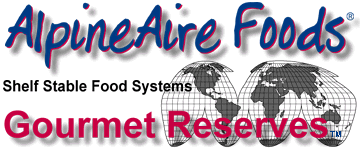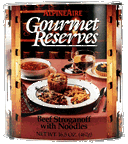
 |
 |
GENERAL INFORMATION
General information regarding food storage tips, emergency water storage, and shelf life can be found in this section.
PROPER FOOD STORAGE TIPS
It is crucial that you store food reserves properly:
- Avoid exposure to heat and moisture. Make sure foods are not accessible to insects or animals.
- Never store food directly on the ground or on concrete floors—moisture can build up inside containers.
- Avoid such storage places that experience temperature build-up such as attics, garages or car trunks.
Ideally, storage for Gourmet Reserves should not exceed room temperature for extended periods.
- Store in a location that's accessible so that periodic inspections are easy. Rotate supplies.
- Storage of some bulk foods can be enhanced by natural aids such as nitrogen, carbon dioxide, bay leaves, rosemary, and diatomaceous earth.
- Avoid excessive and rough handling of pouch and canned foods.
USES FOR WHEAT
The following suggestions are offered for those with wheat storage:
- FLOUR – Baking, Pancakes and Sauces.
- WHOLE GRAIN CEREAL – Cook as is.
- SPROUTING – Eat raw after sprouting. Use in recipes and salads, mix with other ingredients and form loaves.
- WHEAT GRASS JUICE – Grow seed into 5" – 6" grass, juice this grass, drink straight or with other juices.
- SOAKED WHEAT – Soak cleaned wheat in pure water one to two days, drink water and use wheat in cereal or other recipe.
- GLUTEN FOR PROTEIN SUBSTITUTE – Rinse flour to produce gluten product
STORAGE OF EMERGENCY WATER
Various sources recommend home storage of a two week supply of water. The amount often recommended is seven gallons per person for drinking and food preparation, and another seven gallons per person for other limited uses such as hand washing, teeth brushing and dish washing (total fourteen gallons per person for two weeks). Both glass and plastic containers are commonly used for water storage at home. Containers should be clean and sanitary. Glass containers are breakable and somewhat heavy compared to plastic, but they are not permeable to vapors and gases, the amount of leaching (dissolving) of chemicals from glass into water is insignificant. Plastic containers are lightweight and substantially more resistant to breakage than glass.
If plastic containers are used, care should be taken to assure that they are made of plastic approved for food contact by the Federal Food and Drug Administration. Polyethylene plastic is approved for food contact and is commonly used for containers of various sizes, including large 55-gallon drums. Certain types of plastic containers are not intended for food contact (such as vinyl plastic waterbeds, or trash containers) and may leach undesirable chemicals into stored water. Leaching of chemicals from approved plastics is negligible.
For long-term storage, water should be sterilized or disinfected. Water stored in thoroughly cleaned plastic or glass containers can be chemically disinfected for long-term storage by treating each gallon with 16 drops of liquid chlorine bleach (Clorox or Purex type bleaches, containing 4% to 6% sodium hypochlorite). One teaspoon of bleach disinfects five gallons of water. This level of treatment will prevent growth of microorganisms during storage.
Water stored in plastic containers should not be stored near gasoline, kerosene, pesticides or similar substances. Vapors from these substances could permeate the plastic and affect the water. Thick-walled polyethylene containers are significantly less permeable to vapors than are thin walled containers. Be certain, when selecting a storage container for water, that it has a tight fitting cap or lid to prevent entrance of contaminants and evaporation of water. Because sunlight has an adverse effect on plastic, water should be stored away from direct exposure to sunlight.
Sterilized or disinfected water, stored in clean, food-approved containers with secure lids or caps should be safe for use even after many years of storage. Replacement of stored water with fresh water should be necessary only if the stored water becomes contaminated in some way or if the container should begin to leak. Be certain to label each container so there will be no question about its contents. Include the date and information on the method of disinfection used.